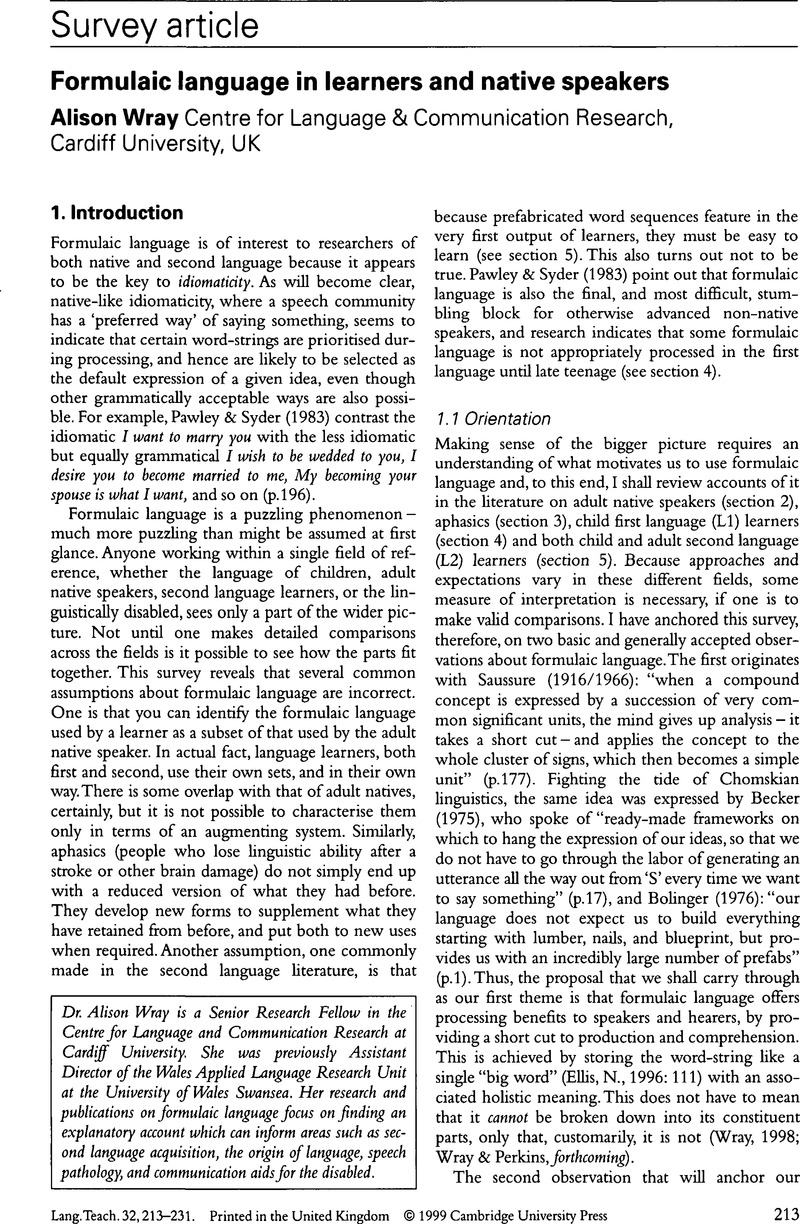Crossref Citations
This article has been cited by the following publications. This list is generated based on data provided by Crossref.
Wray, Alison
and
Perkins, Michael R.
2000.
The functions of formulaic language: an integrated model.
Language & Communication,
Vol. 20,
Issue. 1,
p.
1.
Guendouzi, Jacqueline A.
and
Müller, Nicole
2001.
Intelligibility and rehearsed sequences in conversations with a DAT patient.
Clinical Linguistics & Phonetics,
Vol. 15,
Issue. 1-2,
p.
91.
Block, David
2002.
Communicative language teaching revisited: discourses in conflict and foreign national teachers.
The Language Learning Journal,
Vol. 26,
Issue. 1,
p.
19.
Low, Graham
and
Cameron, Lynne
2002.
Applied-linguistic comments on metaphor identification.
Language and Literature: International Journal of Stylistics,
Vol. 11,
Issue. 1,
p.
84.
Harwood, Nigel
2002.
Taking a lexical approach to teaching: principles and problems.
International Journal of Applied Linguistics,
Vol. 12,
Issue. 2,
p.
139.
Lightbown, Patsy M.
2003.
SLA research in the classroom/SLA research for the classroom.
The Language Learning Journal,
Vol. 28,
Issue. 1,
p.
4.
Littlewood, William
2004.
The Handbook of Applied Linguistics.
p.
501.
Van Lancker-Sidtis, Diana
and
Rallon, Gail
2004.
Tracking the incidence of formulaic expressions in everyday speech: methods for classification and verification.
Language & Communication,
Vol. 24,
Issue. 3,
p.
207.
Wray, Alison
Cox, Stephen
Lincoln, Mike
and
Tryggvason, Judy
2004.
A formulaic approach to translation at the post office: reading the signs.
Language & Communication,
Vol. 24,
Issue. 1,
p.
59.
Van Lancker Sidtis, Diana
2004.
When novel sentences spoken or heard for the first time in the history of the universe are not enough1: toward a dual‐process model of language.
International Journal of Language & Communication Disorders,
Vol. 39,
Issue. 1,
p.
1.
Mauranen, Anna
2006.
Spoken English, Tesol and Applied Linguistics.
p.
143.
Leinonen, Therese
and
Tandefelt, Marika
2007.
Evidence of language loss in progress? Mother-tongue proficiency among students in Finland and Sweden.
International Journal of the Sociology of Language,
Vol. 2007,
Issue. 187–188,
Dekeyser, Robert M.
2007.
Practice in a Second Language.
p.
139.
Stewart, Iain A. D.
and
File, Portia
2007.
Let's Chat: A conversational dialogue system for second language practice.
Computer Assisted Language Learning,
Vol. 20,
Issue. 2,
p.
97.
Barron, Anne
2007.
“Ah no honestly we're okay:” Learning to upgrade in a study abroad context.
Intercultural Pragmatics,
Vol. 4,
Issue. 2,
Davis, John McE.
2007.
Resistance to L2 Pragmatics in the Australian ESL Context.
Language Learning,
Vol. 57,
Issue. 4,
p.
611.
Ranta, Leila
and
Lyster, Roy
2007.
Practice in a Second Language.
p.
141.
Trebits, Anna
2009.
The most frequent phrasal verbs in English language EU documents – A corpus-based analysis and its implications.
System,
Vol. 37,
Issue. 3,
p.
470.
Damber, Ulla
2009.
Using inclusion, high demands and high expectations to resist the deficit syndrome: a study of eight Grade three classes overachieving in reading.
Literacy,
Vol. 43,
Issue. 1,
p.
43.
김봉규
2010.
Effective Teaching of High Frequency Collocational Word-Combinations in The Lion King Animation.
STEM Journal,
Vol. 11,
Issue. 1,
p.
3.



